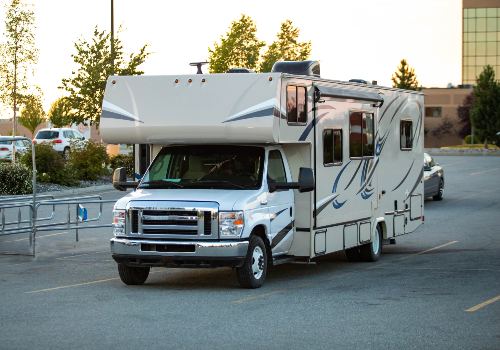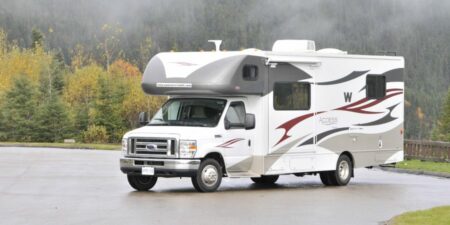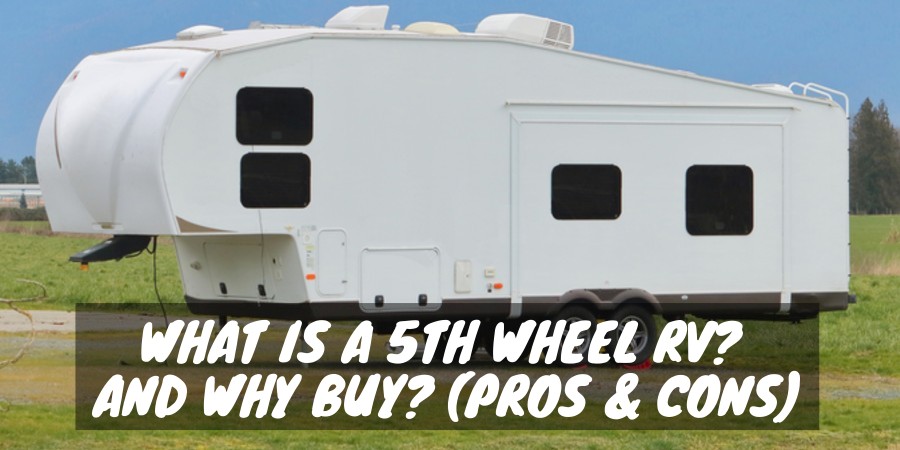Have you ever wondered how much weight your RV can handle or why it’s important to know?
The answer is straightforward: understanding your rig’s weight and capacity is crucial for ensuring safe and efficient travel.
Whether it’s a motorhome, a fifth-wheel, or an SUV towing a travel trailer, the principles are the same.
But how do you determine the weight of your rig and its components? And how much additional cargo can it safely carry?
What are the consequences of an overweight RV? And how can you reduce the rig’s weight?
We’ll tackle all these questions and more as we dive into the fascinating world of RV weight basics.
RV Weight Capacity

What Is Your RV Rig? And How Can You Determine the Weight of Your Rig Components?
Obviously, the weight and capacity of a 38′ motorhome are different from the weight and capacity of an SUV towing an 18′ travel trailer.
The easiest way is to look for a vehicle weight sticker in the door jamb of most tow vehicles and on the exterior side of most towed vehicles. If not there, check the vehicle owner’s manual for weights.
A door jamb, often spelled as “door jam,” is the vertical portion of the door frame onto which a door is secured. It’s essentially the “side” of the door frame, and there are typically two per door: one on the hinge side and one on the knob side.
For motorhomes and campers, the formula for Cargo Carrying Capacity (CCC) is as follows:
Gross Vehicle Weight Rating (GVWR) − Unloaded Vehicle Weight (UVW) − Travel Weights (fuels, water, passengers)
Let’s look at the Cargo Carrying Capacity (CCC) piecemeal:
(what the vehicle was designed to carry)
minus (-)
(the minimum it will carry)
equals (=)
(how much more cargo [e.g., pots, pans, food] it can carry)
Exceed the manufacturer’s CCC at your own peril.
RV Towing Capacity

RVs that are towed (travel trailers, fifth-wheel trailers, tent campers, etc.) add a weight burden to whatever is towing them (cars, trucks, SUVs).
Is the Towing Vehicle Capable of Safely Towing the Camping Rig?
You need to know the total weight of the fully-loaded towed vehicle as well as the capacity of the towing vehicle. Again, this is where manufacturer-weight stickers are helpful.
In addition, coupling equipment capacity also is important. That is, the travel trailer or fifth-wheel hitch must be rated well above the maximum weight of the towed vehicle.
RV Weight Tips
Here are some road-proven tips for making sure that your RV rig travels safely.
- Don’t load your RV to capacity. Instead, use 80% of the Gross Vehicle Weight Rating (GVWR) as the maximum.
- Include Travel Weights accurately. Water is 8.3 pounds (3.77 kilograms) per gallon, propane is 4.2 pounds (1.91 kilograms) per gallon, and real people may be larger than 154 pounds (70 kilograms) each. Don’t forget to add the weight of large pets.
- If you take an external generator, make sure you add its approximate weight to the Travel Weight.
- If in doubt about the actual RV rig weight, take it fully loaded to a truck scale and have the weight certified.
- Travel trailer hitch weight is important to RV safety and should be about 10% of the trailer’s weight. A 3,000 lb (1,361 kg) trailer should have a hitch weight (a portion of the trailer weight transferred to the hitch) of approximately 300 lbs (136 kg).
- Remember that the weakest link in the vehicle chain may be the safety chain. Ensure they are rated sufficiently to hold the trailer if it detaches from the towing vehicle.
- Most trailers average about 250 lbs (113 kg) per foot of length. An 18′ trailer is about 4,500 lbs (2,041 kg); a 32′ trailer is approximately 8,000 lbs (3,629 kg), including travel weights.
- In most states, towed vehicles above 3,000 lbs (1,361 kg) require trailer brakes.
- Construction methods impact the weight of RVs. Some trailers are “lite” with thinner walls and more aluminum than steel, reducing total vehicle weight.
- Make sure all tires are inspected and properly inflated prior to travel.
Conclusion
Understanding the intricacies of RV weight and capacity is an essential part of ensuring safe and enjoyable travels.
By keeping these guidelines in mind and regularly checking your RV’s weight, you’re paving the way for smoother and safer journeys on the open road.
How to Check Your Truck and RV Weight (Video)
Related Questions
Want to Connect With a Community of Over 1,078 RV Enthusiasts?
1. What kind of risks are associated with exceeding the manufacturer’s Cargo Carrying Capacity (CCC)?
Overloading your recreational vehicle beyond its Cargo Carrying Capacity (CCC) can cause a range of problems. It can put unnecessary strain on the vehicle’s engine, transmission, and brakes, which can lead to accelerated wear and tear, potential damage, and premature failure. It can also affect the handling and stability of the vehicle, making it harder to control, which can increase the risk of accidents. It’s always safest to stay within the CCC set by the manufacturer.
2. How does the weight of a recreational vehicle impact its fuel efficiency?
The weight of a recreational vehicle has a direct impact on its fuel efficiency. Generally, the heavier the vehicle, the more fuel it uses. This is because it takes more energy to move a heavier object. So if you’re trying to improve fuel efficiency, one of the ways to do that is to reduce the weight of the vehicle by removing unnecessary items.
3. What’s the importance of checking the hitch rating when towing an RV?
The hitch rating is essentially the maximum amount of weight the hitch can handle. It’s important to make sure that this is well above the weight of the towed vehicle to ensure that it can safely handle the load. If the hitch rating is too low, there is a risk that the hitch could fail while towing, which could lead to an accident.
4. What is the role of safety chains in RV towing, and why should they be sufficiently rated?
Safety chains are an essential part of RV towing safety. They are a backup system designed to keep the trailer connected to the towing vehicle in case the primary hitch connection fails. It’s crucial that they are rated sufficiently to hold the trailer’s weight in such a situation. If they are not, the trailer could become detached from the vehicle, which can cause severe accidents.
5. Why is it important to include the weight of water and propane in the total RV weight?
It’s important to account for the weight of water, propane, and other fluids because they can add a significant amount to the total weight of the RV. This can affect the vehicle’s handling, braking, and fuel efficiency and can also put you at risk of exceeding the vehicle’s maximum allowable weight. Therefore, it’s crucial to consider these weights when calculating the total weight of your RV.
"Man cannot discover new oceans unless he has the courage to lose sight of the shore."
-- Andre Gide











